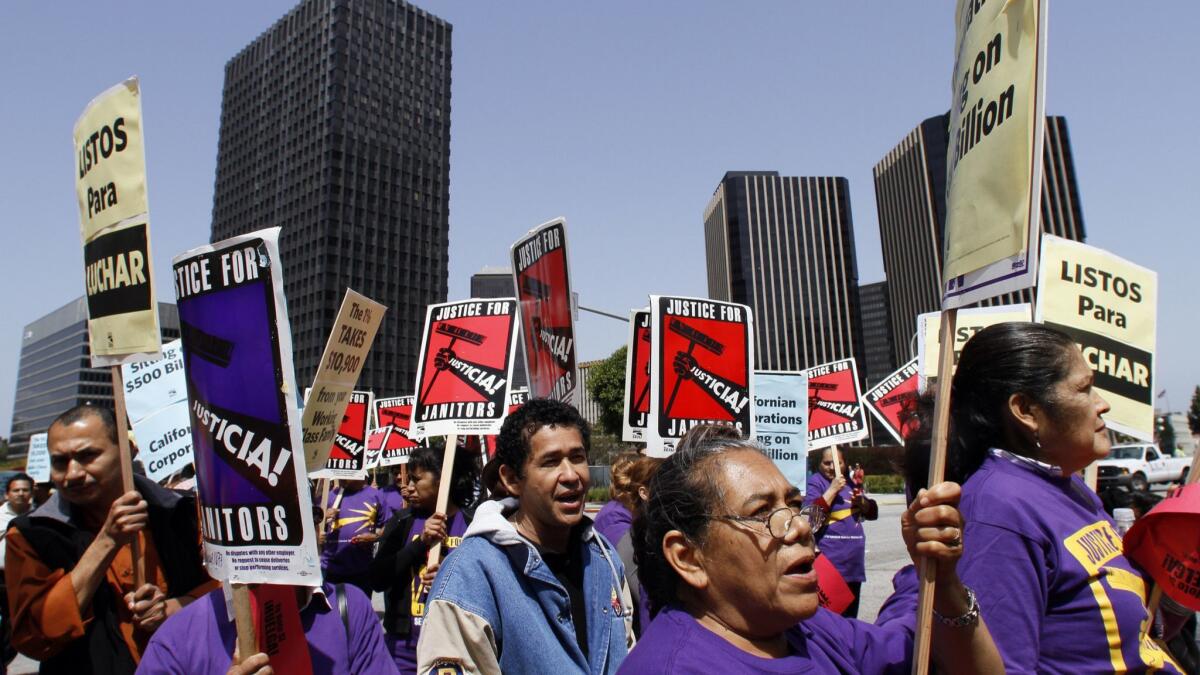California janitors may get labor law protections in wake of federal court decision

- Share via
In a decision opening yet another front in the battle over how to classify workers, a federal appeals court Thursday ruled that an international franchiser could be forced to treat its California janitors as employees rather than independent contractors.
The U.S. 9th Circuit Court of Appeals ruled that the California Supreme Court’s landmark 2018 Dynamex decision, which makes it harder for businesses to classify their workers as independent contractors, applies retroactively to a class-action case against cleaning giant Jan-Pro.
The Georgia-based firm, with 10 California outlets and more than $400 million in global sales, operates “a sophisticated ‘three-tier’ franchising model,” U.S. District Judge Frederic Block wrote in the case, Vazquez vs. Jan-Pro Franchising International. Under the model, ordinary janitors, many of whom are non-English-speaking immigrants, are classified as “unit franchisees,” independent contractors who are not subject to labor laws requiring minimum wages, overtime, disability insurance or other labor law protections.
The lead plaintiff in the case, Gerardo Vazquez, paid Jan-Pro regional franchisee New Venture of San Bernardino $2,800 for the franchise allowing him to clean for the company. Two other named plaintiffs, Gloria Roman and Juan Aguilar, had similar arrangements with a Silicon Valley Jan-Pro franchise, Connor Nolan Inc.
“Jan-Pro obviously has a financial interest in not opening the floodgates to nationwide liability for multiple years of back wages and overtime pay,” the court said. “However, the case has broader ramifications.” Applying the California Supreme Court case’s strict test for classifying workers as independent contractors ensures that “plaintiffs can provide for themselves and their families.”
It also “protects the janitorial industry as a whole, putting Jan-Pro on equal footing with other industry participants who treated those providing services for them as employees.”
Are you an employee or a contractor? Carpenters, strippers and dog walkers now face that question »
Catherine Fisk, a UC Berkeley labor law professor, suggested that the appeals court decision breaks new ground “because it applies the California rule for determining who is an employee to the abuse of franchising.... Companies like Jan-Pro invent a franchise model that allows them to have a huge low-wage work force while disclaiming any responsibility for the working conditions.
“Workers who clean commercial buildings aren’t running independent businesses — they are janitors.… What’s radical, in my view, is the abuse of the franchise model to exploit low-wage labor. This decision is simply a straightforward application of settled law.”
Attorney Shannon Liss-Riordan, who represents the Jan-Pro workers, has also brought cases against other big cleaning franchisers with California operations, including Texas-based Jani-King International and Florida-based Coverall. And she is seeking to apply the Dynamex decision to app-based firms such as Uber, Lyft and DoorDash.
The 9th Circuit decision, she predicted, will have “a widespread impact throughout California to support workers who have been misclassified in a variety of industries.”
In a brief supporting Jan-Pro, the International Franchise Assn., a Washington, D.C.-based industry group, had argued that applying the Dynamex test “would sound the death knell for franchising in California.”
After Thursday’s decision, association spokesman Matthew Haller said, “short of legislative relief or intervention by the U.S. Supreme Court, California’s 76,000 franchise hotels, gyms, restaurants, and retail stores will live in legal uncertainty for the foreseeable future.”
Jeffrey Rosin, a Jan-Pro attorney, said the company will petition for a rehearing on the case, adding that the appeals court decision to retroactively apply the California Supreme Court’s test “presents an unfair situation.”
Janitorial companies have received less attention than newer, gig economy tech firms, but they have been fighting off misclassification lawsuits for more than a decade. “Thousands of cleaning workers throughout California, many of whom are immigrants, have been exploited by a host of national cleaning companies,” Liss-Riordan said.
“These companies claim they are offering workers a chance to start their own business but what they are really doing is selling them low-paid cleaning work,” she said. “Workers pay thousands of dollars for a ‘franchise,’ when what they are really buying is the right to clean office buildings for these companies.”
The federal appeals court ruled only on the issue of whether Dynamex’s strict employment test applies retroactively. In so doing, it sent the case back to a district court that had earlier dismissed the case, but must now rule on its merits, taking into account California’s new standard for independent contractors.
The California Legislature is considering a law, Assembly Bill 5, to codify the Dynamex decision into permanent law. Businesses, including the large gig economy companies, are lobbying for exceptions that would allow them to continue to classify their workers as independent contractors. Unions and worker advocates want to maintain the California Supreme Court’s strict test.
Twitter: @margotroosevelt
More to Read
Inside the business of entertainment
The Wide Shot brings you news, analysis and insights on everything from streaming wars to production — and what it all means for the future.
You may occasionally receive promotional content from the Los Angeles Times.










